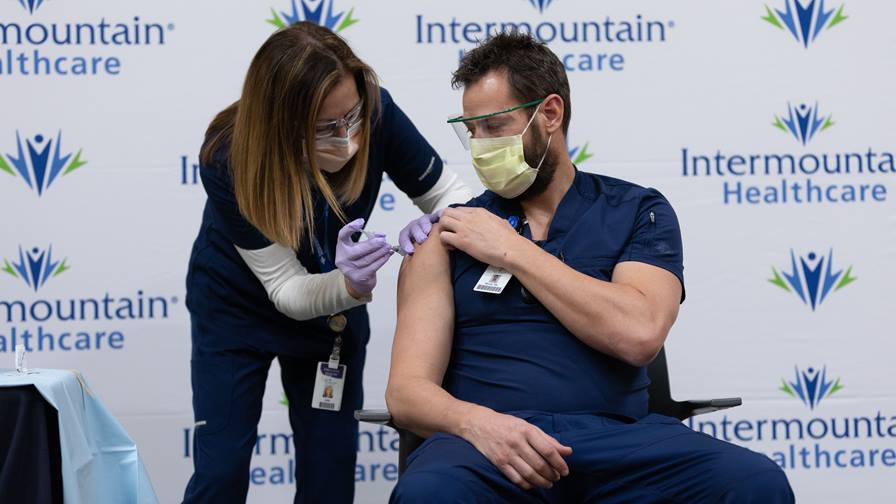
The CDC has approved the Advisory Committee on Immunization Practices’ (ACIP) recommendation for use of updated COVID-19 boosters from Pfizer-BioNTech for people ages 12 years and older and from Moderna for people ages 18 years and older. The new bivalent boosters—boosters effective against both the original strain of COVID-19 and omicron variants—increase protection against newer variants now circulating in our communities.
While caregivers are required to be fully vaccinated against COVID-19 or have an approved medical or religious exemption, receiving the COVID-19 booster—including the new bivalent booster—isn’t required.
“At this time, Intermountain isn’t implementing a COVID-19 booster vaccine requirement,” says JP Valin, MD, Intermountain’s chief clinical officer. “We’ll continue to follow all applicable federal and state laws and regulations and will make adjustments if needed.”
Even though a booster dose isn’t required, caregivers are strongly encouraged to get the bivalent booster.
“The BA.5 variant remains dominant in our communities,” says Tamara Sheffield, MD, senior medical director of preventive medicine. “Fall is coming, and like last year, we anticipate an increase in cases. Now is the time to protect yourself. This new booster is highly endorsed to protect caregivers and the community.”
You’re encouraged to get the bivalent booster if it’s been at least two months since your last COVID vaccine dose (and you’ve finished the primary series). Employee Health won’t be administering booster doses to caregivers, so contact your primary care clinic, local health department, or preferred community pharmacy starting next week to schedule an appointment.
Who’s eligible to receive a single booster dose and when?
Eligibility for a booster depends on a person’s age, when they finished their primary vaccination, and when they received their most recent dose of a monovalent COVID-19 vaccine—vaccines only formulated to protect against the original COVID-19 strain.
- Individuals 18 years and older are eligible for a single booster dose of the Moderna COVID-19 bivalent vaccine if it’s been at least two months since they completed primary vaccination or received the most recent booster dose with any authorized or approved monovalent COVID-19 vaccine.
- Individuals 12 years and older are eligible for a single booster dose of the Pfizer-BioNTech COVID-19 bivalent vaccine if it has been at least two months since they completed primary vaccination or received the most recent booster dose with any authorized or approved monovalent COVID-19 vaccine
- No monovalent boosters are authorized anymore for ages 12+ years, and patients scheduled to receive a booster should be rescheduled for a time with the bivalent booster is available. However, the monovalent Pfizer booster is still recommended for healthy and immunocompromised children ages 5-11 years.
- For ages 5-11 years, the monovalent booster is given five months after the primary series for healthy children, and three months after the additional primary dose for immunocompromised children.
- Consider waiting three months after a COVID infection to receive a COVID vaccine dose.
- Novavax COVID vaccine for ages 12 years and older isn’t authorized as a booster dose, but those who received Novavax COVID vaccine as their primary series should get either a Pfizer or Moderna bivalent booster.
For questions about the new bivalent booster, please contact Dr. Tamara Sheffield at tamara.sheffield@imail.org. For questions about the COVID-19 vaccine requirement, please contact Employee Health by calling 801-442-6767 or emailing ehservices@imail.org.
Primary Clinical Guidance
- Persons are considered up-to-date when they’ve received a primary series of monovalent vaccine and a dose of the most recent booster (currently the most recent booster is the Bivalent Original and Omicron).
- Consider waiting three months after a COVID infection to receive a COVID vaccine.
- It’s recommended to wait two weeks after a COVID vaccine to administer EVUSHELD.
- Coadministration: COVID vaccines may be administered with any other vaccine with the exception of the orthopoxvirus vaccines. Consider waiting four weeks after an orthopoxvirus vaccine (such as JYNNEOS) to administer a COVID vaccine.
- Safety: local and systemic reactogenicity to a bivalent booster dose is similar or slightly less than with primary series doses. When compared to those who received a primary dose of mRNA vaccine, the booster dose of mRNA vaccines has a lower rate of rare myocarditis/pericarditis after vaccination.
- Immunogenicity: Prespecified immunogenicity endpoints were met for bivalent boosters with improved durability of neutralizing antibodies with the bivalent booster dose compared to the original vaccine. Over 1400 persons receiving a bivalent vaccine containing an Omicron component have been studied. Bivalent vaccines appear to provide more diverse response overall, likely improving response to future variants.
- Limitations: Clinical and immunogenicity data is not available in humans for the Omicron BA.4/BA.5 bivalent vaccine but is currently being studied. Animal studies and models show appropriate immunogenicity responses. This COVID bivalent booster is being treated like the annual influenza vaccine which is built on a known platform, but variant strains are included and administered prior to clinical testing of the new strain. Results from trials of Omicron BA.1 and Beta variants are extrapolated to provide expected results for Omicron BA.4/BA.5 vaccine. No data available yet for ages 12-17 years for any bivalent vaccine.

